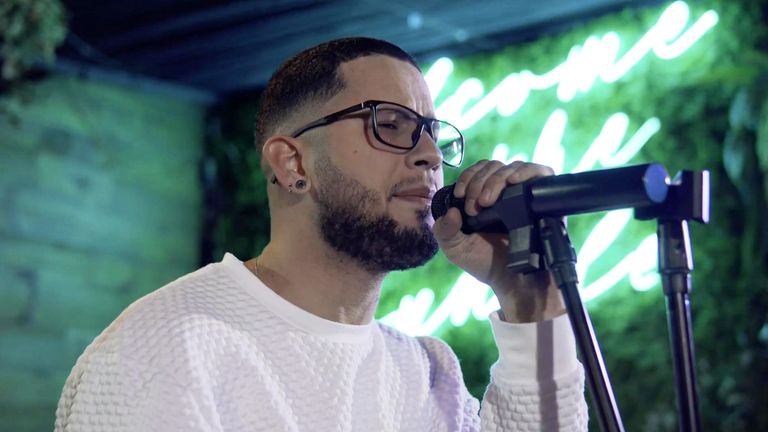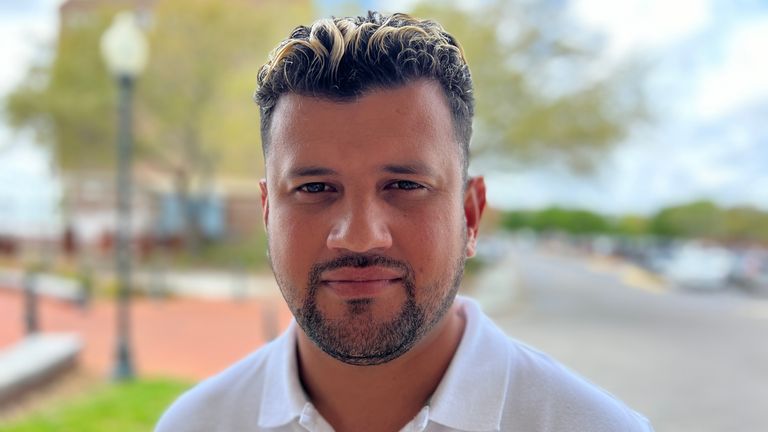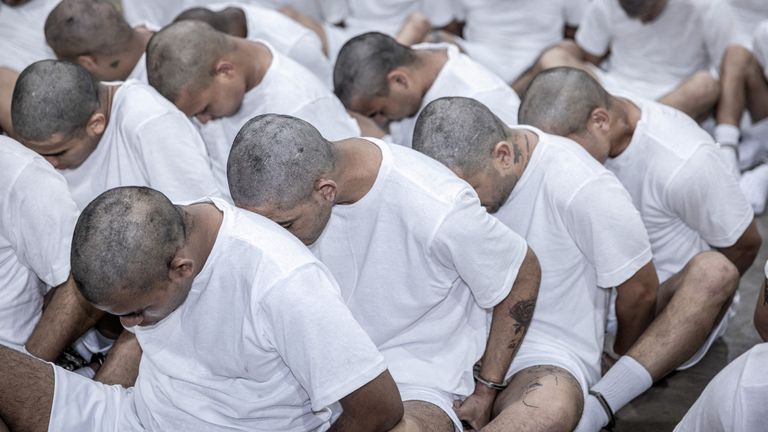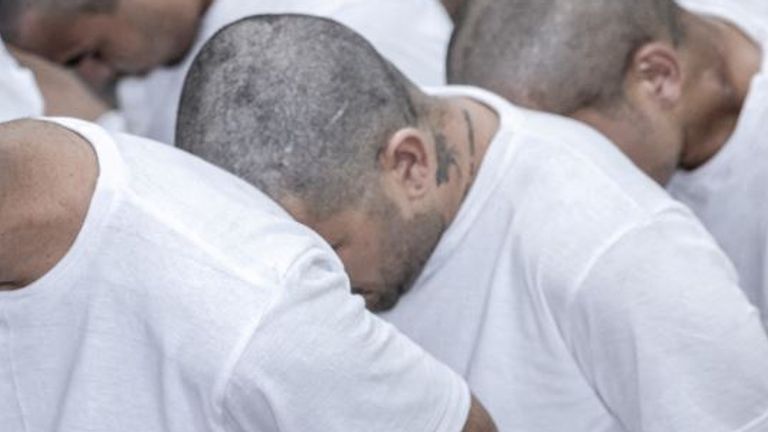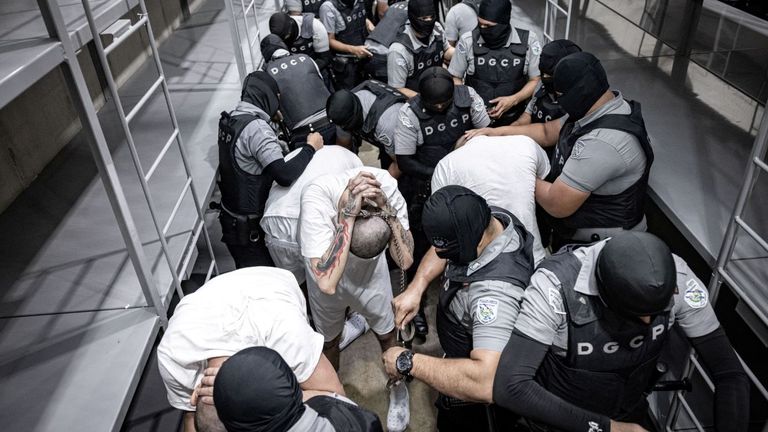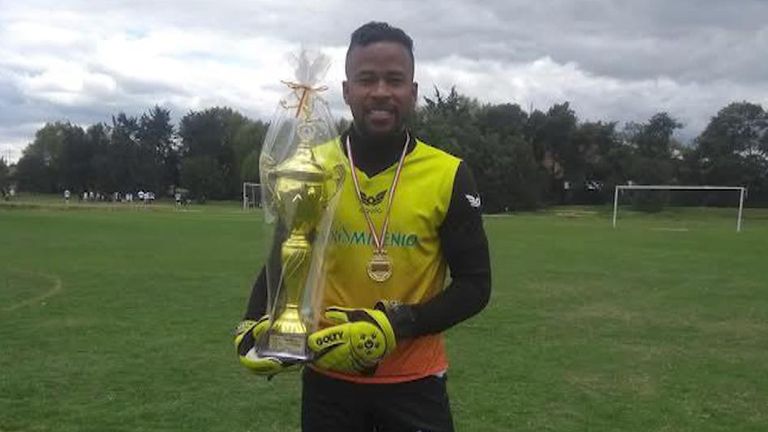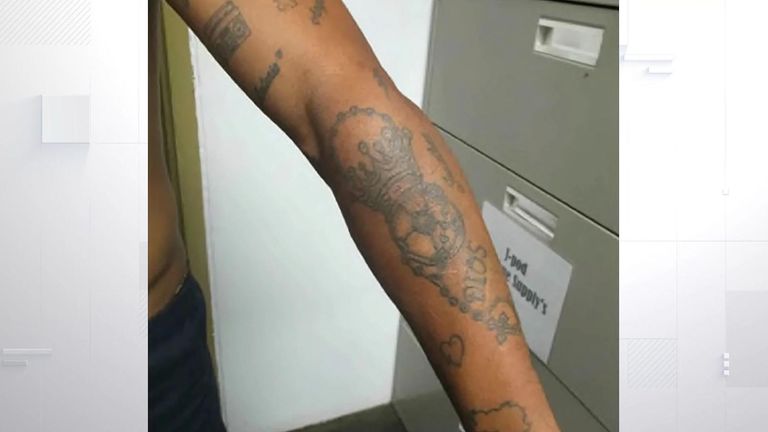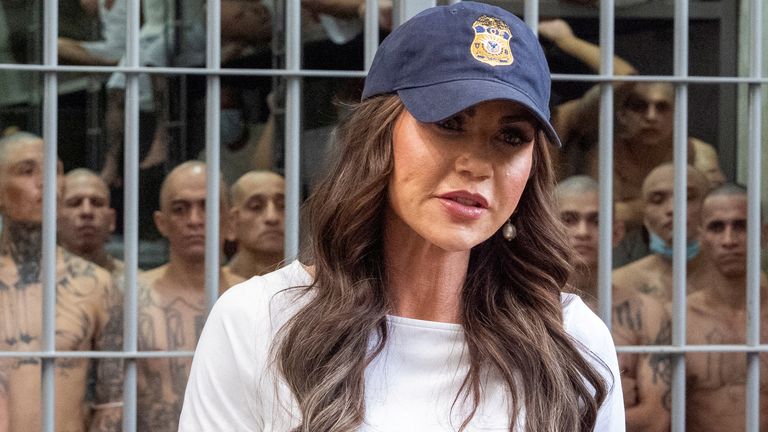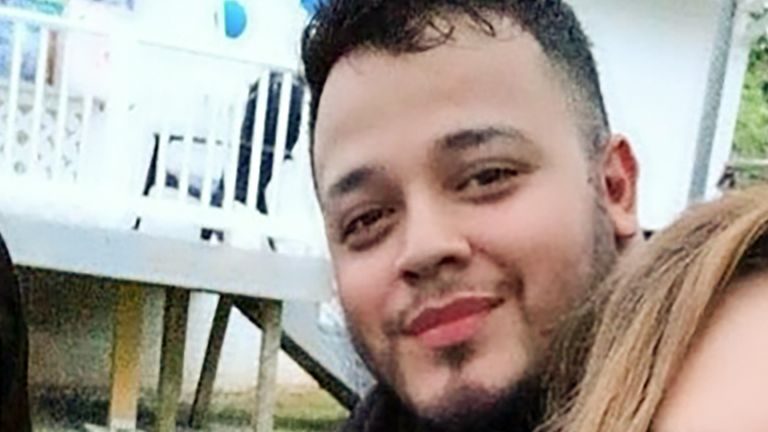My Brother Faced ‘Lion’s Den’ in El Salvador Jail Under Trump Administration | US News
Just five weeks ago, Arturo Suarez was a professional singer performing in the United States while awaiting the processing of his asylum application.
Hailing from Venezuela, he entered the US through legitimate means.
However, he now finds himself confined in a notorious prison in El Salvador, a situation imposed by the Trump administration, despite never having undergone a trial or committed any offenses. The White House purports that he is linked to gangs but has failed to substantiate this claim.
His brother, Nelson Suarez, told Sky News that he believes his brother’s only so-called “crime” is being Venezuelan and sporting tattoos.
“He is not involved with gangs,” Nelson asserts firmly, “I’ve concluded it must be due to the tattoos. If he doesn’t have a criminal record and hasn’t committed any crime in the United States, what other explanation could there be? Because he’s Venezuelan?”
At 34 years old, Arturo was recording a music video in March when immigration agents apprehended him.
Initially, he was taken to a deportation facility in El Paso, Texas, and subsequently appears to have been flown on a military aircraft to El Salvador.
Since that time, his family has had no communication with him. Lawyers and immigrant rights organizations have been unable to contact any of the over 200 Venezuelan men sent to the CECOT prison, notorious for housing members of the MS-13 and Tren de Aragua gangs.
Identifying Arturo Suarez’s location by tattoos
Nelson discovered that his brother is likely at CECOT only after he recognized a photo on a news website depicting a group of inmates with their hands and feet restrained, heads shaved, and bodies shackled together.
“You can clearly see the hummingbird tattoo on his neck,” Nelson points out in the photo. He notes that Arturo wanted this tattoo to honor their late mother. Overall, Arturo has 33 tattoos, including a piano, poems, and scriptures from the Bible.
It’s possible that one or more of these tattoos brought him into the spotlight of President Trump’s anti-immigration initiatives. Nelson has documents indicating that Arturo has no criminal background in Venezuela, Chile, Colombia, or the United States, the four countries he has lived in.
Sky News reached out to the White House, the Department of Homeland Security (DHS), and Immigration and Customs Enforcement (ICE) for comments regarding Arturo’s case but received no response.
In March, Donald Trump enacted the Alien Enemies Act, a law originating from 1798 that has previously been invoked only three times, all during wartime.
This law permits the president to detain and deport legally residing immigrants based on their origin from countries considered “enemies” of the government. In this case, Trump stated that the Venezuelan gang Tren de Aragua had “infiltrated the United States” and was “conducting irregular warfare”.
Tattoos as gang identifiers
Immigration agents have fixated on particular tattoos as gang identifiers. Officers were supplied with a document called the “Alien Enemy Validation Guide”, according to a legal filing from the American Civil Liberties Union. This document delineates a point-based system to assess whether an immigrant in custody “may be validated” as part of a gang.
Immigrants scoring six points or higher may be categorized as Tren de Aragua gang members, with tattoos classified under a “symbolism” category earning four points, while social media posts depicting gang symbols result in two points. Suspicious tattoos, as classified, include crowns, stars, and the Michael Jordan Jumpman logo.
Jerce Reyes Barrios’s narrative
Another individual sent to CECOT is 36-year-old Jerce Reyes Barrios, who fled Venezuela last year after engaging in anti-government protests. He is a former soccer player and coach.
His attorney, Linette Tobin, informed Sky News that Reyes Barrios lawfully entered the US after waiting in Mexico for four months for an immigration appointment and then presenting himself at the border.
She states that he was held in a maximum-security facility in the US while waiting for his asylum appointment. But just before this could occur, he was transported to the El Salvador prison.
Ms. Tobin claims that the DHS deported Reyes Barrios because they labeled him a Tren De Aragua gang member based on two pieces of supposed evidence.
The first is a tattoo featuring the Real Madrid football club logo encircled by rosary beads. She has since obtained a statement from the tattoo artist confirming that Reyes Barrios simply desired a representation of his favorite team.
The second piece of evidence, she claims, is a photograph of Reyes Barrios in a hot tub with friends taken during his college years 13 years ago.
In the image, he makes a gesture often interpreted as “rock and roll,” which she contends has been misinterpreted as a gang symbol.
Despairing families
Reyes Barrios has no criminal history in Venezuela. “I’ve never encountered anything like this,” Ms. Tobin remarks.
“My client was deported to a third country, and we currently have no means of contacting him. His family is devastated and distressed, often even crying, uncertain about his situation. We want him returned to the United States to receive a fair hearing and due process.”
Ms. Tobin and other attorneys representing men sent to the El Salvador prison are attempting to establish a UN working group on enforced disappearances to conduct wellness checks, as the prison operates entirely incommunicado.
Sky News reached out to the DHS regarding Reyes Barrios’s case, yet did not receive a response. The DHS previously issued a statement asserting, “DHS intelligence assessments extend far beyond merely gang-associated tattoos. This man’s own social media indicates his membership in Tren de Aragua.”
Reyes Barrios has a hearing regarding his immigration scheduled for April 17, according to Ms. Tobin, who states that the Trump administration is attempting to dismiss it on the basis that he is no longer in the US.
In the meantime, children he previously coached in football in his hometown of Machiques, Venezuela, have been conducting a prayer vigil for him, advocating for his release.
The DHS Secretary, Kristi Noem, visited CECOT last month, capturing photos beside inmates behind bars.
“Do not enter our country illegally,” she warned, “you will be forcibly removed, and you will face prosecution.” During his campaign, Donald Trump pledged to tighten immigration measures, condemning undocumented immigrants and asserting that they are “poisoning the blood of our nation”.
When I inquire how Nelson felt observing Ms. Noem’s photo opportunity at the prison, knowing his brother might be near, he responds, “I feel anguished. It’s dreadful, because those images only portray criminals. With my brother, it seems more like a political issue. They required statistics, declared these are the figures, and now it’s like, ‘let’s throw them to the lions.’”
The case of Kilmar Abrego Garcia
The Trump administration acknowledged that at least one man sent to the El Salvador prison was a result of “administrative error.” Kilmar Abrego Garcia, who was residing in Maryland, was transported to CECOT despite a previous 2019 ruling from a judge permitting him to remain in the US legally.
The White House has alleged that Garcia is an MS-13 gang member, but his attorneys contend that there is no evidence to corroborate this.
👉 Follow Trump 100 on your podcast app 👈
A federal judge has issued an order for Garcia to be returned to the US by Monday, April 7. In a post on X, White House deputy chief of staff Stephen Miller referred to the judge as a “Marxist,” suggesting she now believes she is the president of El Salvador.
White House press secretary Karoline Leavitt commented: “We suggest the judge get in touch with President Bukele, as we are not aware of the judge having jurisdiction or authority over the country of El Salvador.”

